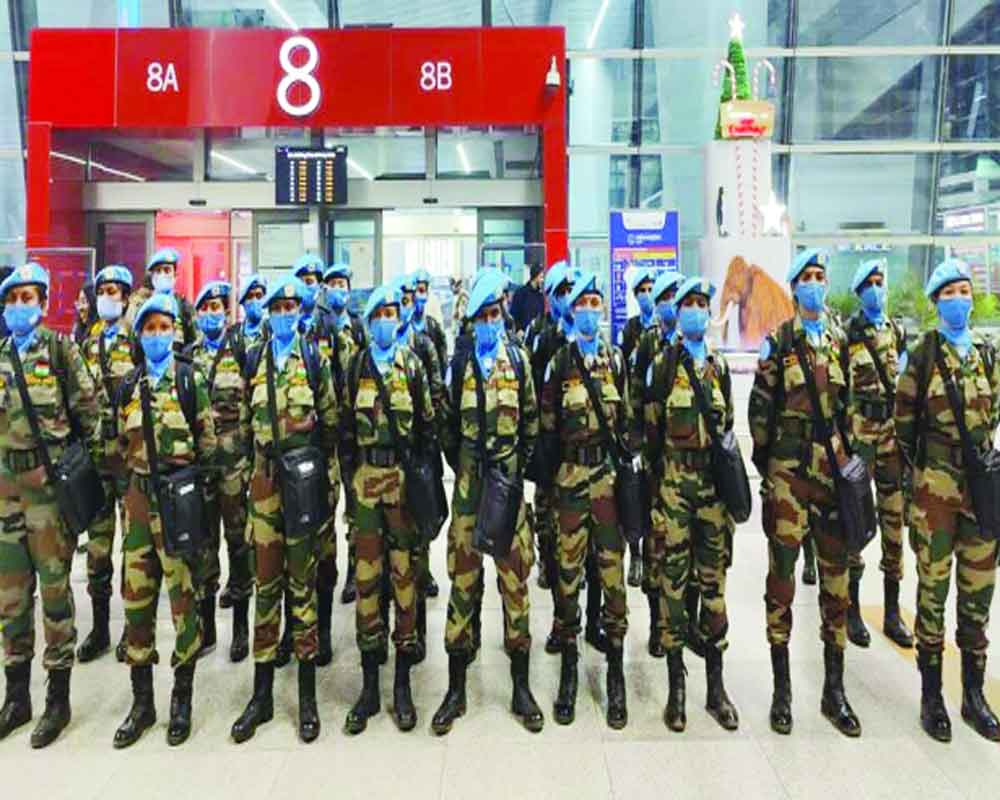India is deploying an all-women contingent in Sudan’s Abeyi region as part of its peacekeeping missions under the aegis of the United Nations.
It will be India’s largest single unit of female soldiers in a UN mission since 2007. The Army team comprises two officers and 25 other ranks.
Hailing the development, Prime Minister Narendra Modi said, “Proud to see this. India has a tradition of active participation in UN peacekeeping missions. The participation by our Nari Shakti is even more gladdening.”
He was reacting to an Army tweet that said, “Indian Army deploys its largest contingent of women peacekeepers in United Nations mission at Abyei, UNISFA.
“The team will provide relief and assistance to women and children in one of the highly operational and challenging terrain conditions under the UN flag.”
India is deploying an all #women’s platoon of peacekeepers as part of our battalion to the UN Mission in #Abyei @UNISFA_1. This is the single largest deployment of women #peacekeepers in recent years. Good wishes to the team!” India’s Permanent Representative to the UN Ambassador Ruchira Kamboj tweeted late on Thursday.
The platoon of women peacekeepers will be deployed in Abyei as part of the Indian Battalion in the United Nations Interim Security Force, Abyei (UNISFA) on January 6, 2023.
The Indian contingent, comprising two officers and 25 other ranks, will form part of an engagement platoon and specialise in community outreach and will be performing extensive security-related tasks as well.
In September last year, Kamboj had said in a United Nations Security Council briefing on United Nations Peacekeeping Operations that the role of women peacekeepers cannot be over-emphasised ineffective peacekeeping.
She had underlined that India took pride in having deployed the first-ever all-women peacekeeping contingent in Liberia in 2007, “which inspired a whole generation of Liberian women to take part in the country’s security sector. We stand ready to contribute further to this regard.”
The Indian mission noted in a statement that women peacekeepers are “highly regarded” in UN missions throughout the world for their ability to reach out and connect with women and children in local populations, especially victims of sexual violence in conflict zones.
“Indian women particularly have a rich tradition in peacekeeping,” said the statement, adding that the UN’s first Police Adviser Dr Kiran Bedi, United Nations Military Gender Advocate of the Year Award 2019 honoree Major Suman Gawani and Shakti Devi have made a mark for themselves in UN Peacekeeping.
In 2014, Devi of the Jammu & Kashmir Police, who was deployed in the UN Assistance Mission in Afghanistan (UNAMA), was named the recipient of the International Female Police Peacekeeper Award by the UN’s Police Division for her “exceptional achievements” with the UN mission in Afghanistan, including her efforts towards helping victims of sexual and gender-based violence.
“Our teams in the Congo and South Sudan have also done sterling work in mainstreaming women and children into community and social developmental projects at the grassroots level,” the Indian mission said.
The role of the 125-strong women peacekeepers of the Indian Formed Police Unit deployed with the UN mission in Liberia has been lauded for inspiring women in the West African nation to become police officers. Then UN Secretary-General Ban Ki-moon had hailed India’s women’s peacekeeping unit in Liberia as an inspiration for all, saying their conduct served as an example of how women can help the world body in its efforts to combat sexual exploitation and abuse.
As of October 31, 2022, India is the second largest contributor to UN peacekeeping missions with 5887 troops and personnel deployed across 12 missions, after Bangladesh (7,017).
More than 200,000 Indians have served in 49 of the 71 UN peacekeeping missions established around the world since 1948.
India has a long tradition of sending women on UN peacekeeping missions. In 1960, women serving in the Indian Armed Forces Medical Services were interviewed by UN Radio before being deployed to the Republic of the Congo.





















